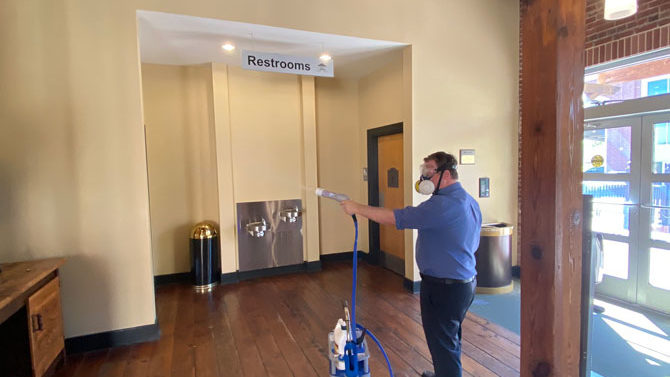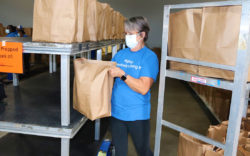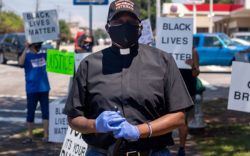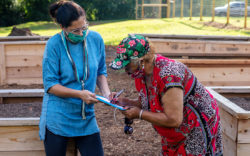We are seeing the world as we’ve never seen it in our lifetimes. Traffic on our highways is a thing of the past. As the smog lifted, Indians in the Punjab region reported that they could now see Mount Everest, hundreds of miles away, for the first time since World War II. Seismologists are recording a huge drop in “seismic noise” as the entire world parks its cars and trucks, shuts down businesses and huddles inside with phones. And here in Athens, it’s easy to get a parking space downtown—but where would you go, except to pick up food from once-buzzing restaurants?
The visible part of Athens’ business community—the retailers, bars and restaurants that make up so much of the town’s appeal and culture—have gone online or otherwise changed their business models in response to the coronavirus pandemic. Businesses are adapting to this new normal with creativity, finding new ways to serve their customers and keep their employees on the payroll. At the same time, these companies are taking advantage of the federal benefits made possible by the recently passed CARES economic relief act, mitigating the damage caused when the economy turned upside down.
The Classic Center is humming once again after laying off most of its employees—not with concerts or plays or conferences, but with manufacturing and distribution. As part of the deals it negotiated, the new tenants are hiring back many Classic Center staff members who would otherwise be unemployed.
The first company, BYOPlanet, has moved its production from Florida to Grand Hall G, a 30,000 square-foot space, to build sanitizing machines. These devices spray disinfectant accompanied by an electrical charge that helps the product stick to surfaces, making the process much faster. In exchange for low rent, BYOPlanet has hired about 40 laid-off Classic Center employees. Paul Cramer, executive director of the Classic Center, said the extendable two-month lease came together almost immediately after the center had to cancel all its upcoming events.
The Dean Group has leased a large event space in the Foundry Street Warehouses, the older building behind the Classic Center, to distribute LynkTrak Technologies’ personal protective equipment (PPE), such as gloves, masks and gowns. Robert Finch, head of the Dean Group, said that LynkTrak will begin manufacturing these items in Athens beginning in fall 2020, eventually hiring up to 25 Classic Center employees. Another hall will be used by volunteers to sew face masks for local hospitals.
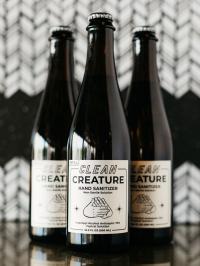
Meanwhile, other local companies continue to rise to the challenges presented by the crisis. As Creature Comforts has shifted to a curbside delivery mode, the company has seen its tasting room revenue drop dramatically. When hand sanitizer became scarce, CEO Chris Herron and his brewers, guided by the World Health Organization’s recipe, created a gel using the isopropyl alcohol they use to clean their equipment. The product, dubbed Clean Creature, will be sold in 500 milliliter beer bottles at the brewery’s drive through window, reached via a driveway off Washington Street. Herron said that he has been able to keep all his employees on the payroll.
With its small footprint, Daily Groceries Co-op has adopted a strict curbside format, with no customers entering the store. Customers enter their order on the store’s website, pay with a credit card, and are given a date and time to pick up their orders.
Monira Silk, the owner of the local baby shop Reblossom, continues to serve her customers by offering Zoom and Facebook meetings for story time, advice on breastfeeding, and yoga classes, among other services. Since the store is now closed to walk-ins, Silk will even FaceTime with customers to show her products.
In addition to offering her customary range of titles online, Avid Bookshop owner Janet Geddis has reached out to her shop’s greeting card customers, offering to hand-select snail-mail greeting cards for specific occasions. The cards are then sent to customers with envelopes stamped with first-class postage.
Meanwhile new nonprofits are springing up to help mitigate the economic damage to local businesses. The Athens Works Initiative is the brainchild of New Urban Forestry owner Kevin Hamman, who wanted to encourage local businesses to join him in helping local restaurants weather the crisis. Company owners still operating take a pledge on the AWI website, athensworksinitiative.com, to support participating local restaurants. So far, 25 companies have pledged to support these restaurants and are ordering lunches for their employees. Local organizer Fenwick Broyard said that he hopes that the program becomes well known among Athenians in time for the much-awaited arrival of CARES stimulus checks.
The Athens Convention and Visitors Bureau also promotes local restaurants on its website, where the organization has posted this publication’s list of restaurants providing curbside service. (Flagpole has a similar online list, updated regularly.)
Help Is on the Way
To take advantage of part of the $2 trillion CARES relief program, local business owners and self-employed individuals alike are applying for two basic forms of economic disaster aid.
First, there is the $350 billion Payroll Protection Program that provides companies and nonprofits with the funds to keep their employees on the payroll for 10 weeks, or 2.5 times a company’s average monthly payroll for 2019, in the program’s first round. Self-employed and “gig economy” workers are also eligible to apply. Though the funds are referred to as loans, the debt will be forgiven if employers keep their workers on the payroll. Companies seeking loans apply through their banks.
Kevin Lang, a business attorney with Fortson, Bentley and Griffin law firm who is familiar with the terms of the loans, said that “most borrowers should have the entire loan forgiven.” He added that almost certainly more applications will be filed than there are funds available..
The second program, called Economic Injury Disaster Loans (EIDL), is administered by the Small Business Administration (SBA) and provides low-interest loans for small businesses, tribal businesses and nonprofit organizations. Applications are online at the SBA’s website, sba.gov. The program is designed to get money quickly to companies for multiple uses, waiving typical qualifying information. Unlike the PPP loans, EIDL’s need to be repaid.
Companies are free to apply for both types of loans. Some conditions apply, should a company be accepted for both programs.
Clocked owner Lisa Yaconelli described the process of signing up for the PPP as “fairly simple.” Yaconelli reached out to her banker and obtained an initial identifying form that, once accepted by the government, bounced back a more comprehensive four-page form that required additional financial information. Above the signature line, she was asked to commit to a number of “certifications and authorizations,” including a commitment to purchase American-made goods as much as possible. At this writing, she has not learned when she will receive the money.
In the meantime, like many restaurants, Clocked remains open, serving burgers and tots from an abbreviated menu for pickup and delivery from 4–8 p.m. Two chefs cook in the kitchen, presumably giving each other six feet of space, while a cashier brings food to hungry customers waiting at a new window installed by the restaurant’s landlord.
Like what you just read? Support Flagpole by making a donation today. Every dollar you give helps fund our ongoing mission to provide Athens with quality, independent journalism.



